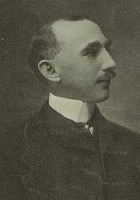Madison Julius Cawein Biography
Madison Cawein (23 March 1865 – 8 December 1914) was a poet from Louisville, Kentucky, whose poem "Waste Land" has been linked with T. S. Eliot's later The Waste Land.
Cawein's father made patent medicines from herbs. Cawein thus became acquainted with and developed a love for local nature as a child. He worked in a Cincinnati pool hall as an assistant cashier for six years, saving his pay so he could return home to write. His output was thirty-six books and 1,500 poems. He was known as the "Keats of Kentucky."
In 1912 Cawein was forced to sell his Old Louisville home, St James Court (a two-and-a-half story brick house built in 1901, which he had purchased in 1907), as well as some of his library, after losing money in the 1912 stock market crash. In 1914 the Authors Club of New York City placed him on their relief list. He died later that year and was buried in Cave Hill Cemetery.
The link between his work and Eliot's was pointed out by Canadian academic Robert Ian Scott in The Times Literary Supplement in 1995. The following year Bevis Hillier drew more comparisons in The Spectator (London) with other poems by Cawein; he compared Cawein's lines "...come and go/Around its ancient portico" with Eliot's "...come and go/talking of Michelangelo."
Cawein's "Waste Land" appeared in the January 1913 issue of Chicago magazine Poetry (which also contained an article by Ezra Pound on London poets).
Cawein's poetry allied his love of nature with a devotion to earlier English and European literature, mythology, and classical allusion. This certainly encompassed much of T. S. Eliot's own interest, but whereas Eliot was also seeking a modern language and form, Cawein strove to maintain a traditional approach. Although he gained an international reputation, he has been eclipsed as the genre of poetry in which he worked became increasingly outmoded.
The old gate clicks, and down the walk,
Between clove-pink and hollyhock,
Still young of face though gray of lock,
Among her garden's flowers she goes
At evening's close,
Deep in her hair a yellow rose.
...
The hills hang woods around, where green, below
Dark, breezy boughs of beech-trees, mats the moss,
Crisp with the brittle hulls of last year's nuts;
The water hums one bar there; and a glow
Of gold lies steady where the trailers toss
...
Meseemed that while she played, while lightly yet
Her fingers fell, as roses bloom by bloom,
I listened dead within a mighty room
Of some old palace where great casements let
...
White moons may come, white moons may go-
She sleeps where early blossoms blow;
Knows nothing of the leafy June,
...
